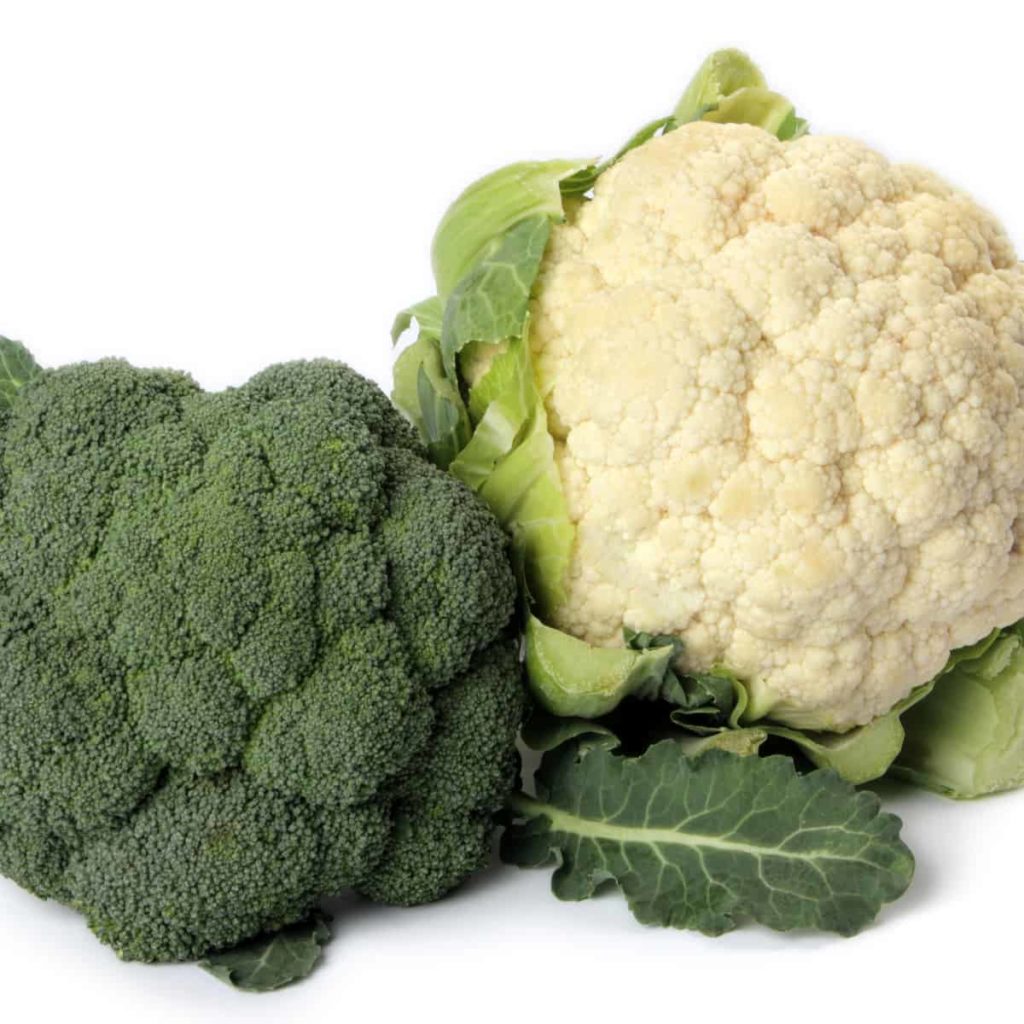Vegetables are an excellent food option due to their numerous benefits. Since they provide so many health benefits, some research suggests people who eat vegetables regularly are more likely to have a reduced risk of certain chronic health conditions.
These kinds of foods provide the nutrients needed for the overall health and maintenance of the body. In this article, we will talk about two specific vegetables – broccoli and cauliflower – that are known as great sources of nutrition.
What are Cauliflower and Broccoli?
Cauliflower is a cruciferous veggie that belongs to the cabbage family. Its origin dates back to the 12th to 16th century, often called “the Snow Flower.” This hearty white vegetable was first used in English in 1597 by a famous botanist John Gerard.
Broccoli is also a cruciferous vegetable and is technically human-made. This is because broccoli was bred out of wild cabbage. Its name was derived from an Italian word meaning “arm” and today is cultivated and consumed in many countries in the world.
Nutritional Value of Cauliflower
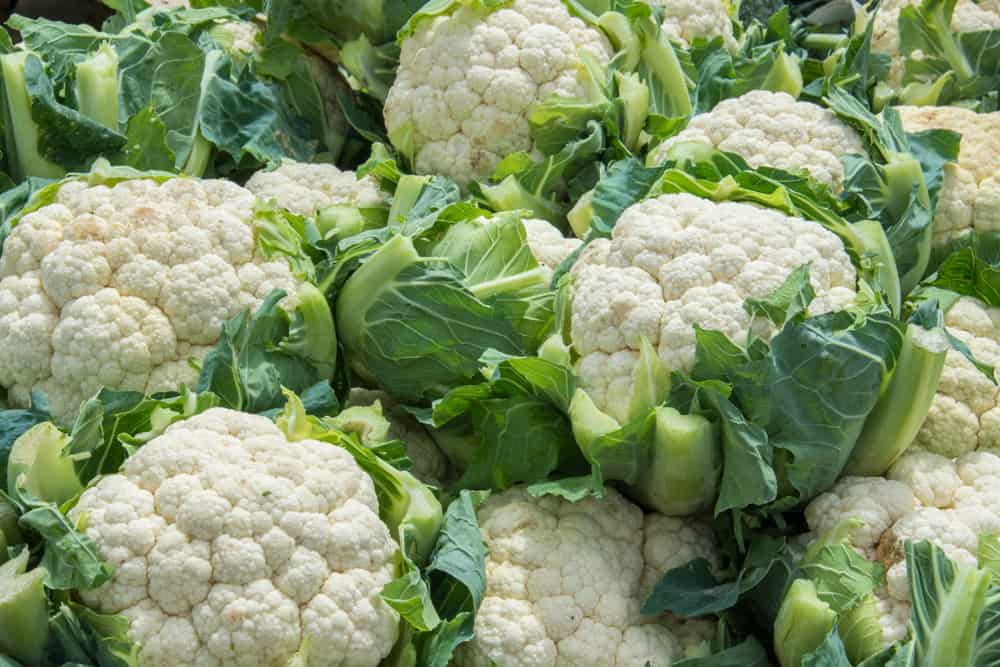
According to the United States Department of Agriculture, one cup of raw chopped cauliflower, or about 107 grams, contains:
- 27 calories
- 24 milligrams of calcium
- 47 grams of phosphorus
- 320 mg of potassium
- 61 mcg of folate
- 0.197 mcg of vitamin B6
- 16 mg of magnesium
- 5 grams of carbohydrate, including 2 grams of sugar and 2.1 grams of fiber
- 52 mg of vitamin C
- 2 grams of protein
- 0.3 grams of fat
Also, there are smaller amounts of niacin, pantothenic acid, potassium, iron, calcium, manganese, and riboflavin.
Cauliflower and broccoli are great food choices for a weight-loss plan centered around calorie density like Noom. Every Noom subscription comes with a personal coach, group coach, dedicated group of social support, and a clinically-proven weight-loss process. Check it out with today’s free trial offer.
Health Benefits of Cauliflower
Cauliflower is not only a source of nutrients, but it also has many health benefits and can reduce the risk of certain health conditions. Let’s check out some of the main health benefits of cauliflower below.
Anti-Inflammatory Properties
Being an anti-inflammatory vegetable is one of the most essential health benefits of cauliflower. Inflammation is responsible for many of the negative health conditions today.
Cauliflower is known for being able to reduce inflammation in the body and combat oxidative stress, according to research published in the Polish scientific Journal Annals of the National Institute of Hygiene. Moreover, this vegetable has bioactive properties that stimulate detoxification enzymes, induce immune functions, and scavenge free radicals that combat inflammation.
There is also isothiocyanate that slows down many inflammation processes and decreases the risk of numerous chronic health issues.
One cup of cauliflower contains approximately 73% of the recommended daily value of vitamin C, which helps boost immunity, reduce inflammation, and keep the body free of harmful bacteria and viruses that can cause sickness.
Weight Loss
Cauliflower is only 27 calories, so you can eat as much as you can without gaining weight.
It can also be served as a substitute for such high-calorie food as flour and rice. Also, cauliflower is known for being rich in fiber, according to Nutrients. This means that consuming cauliflower may increase satiety and keep you full for a longer period – eliminating the need to eat more often.
You can use cauliflower to replace legumes and grains in the meal. Cauliflower has lower carbs than other legumes and grains, so substituting this vegetable for these foods is a great way to follow a low-carb diet. Moreover, one study published in Nutritional Reviews shows that fiber is needed to lower the risk of some conditions associated with obesity.
Heart Health
Cauliflower is high in vitamin K, known as an essential nutrient for blood clotting. Vitamin K also helps decrease the risk of cardiovascular issues and improves heart health.
Therefore, it is thought that the regular consumption of cauliflower improves blood circulation, contributes to maintaining blood vessels, which can be attributed to the presence of sulforaphane in the vegetable. According to Oxidative Medicine and Cellular Longevity, the anti-inflammatory properties of sulforaphane help reduce the risk of cardiovascular health problems.
Another compound found in cauliflower – glucoraphanin – also helps maintain heart health and prevent numerous cardiovascular conditions. It is believed to promote anti-inflammatory activities and prevent the accumulation of lipids in the blood vessels.
One more component found in cauliflower that effectively synthesizes lipids, triglycerides, and cholesterol is Isothiocyanate, indole-3-carbinol, or I3C. Isothiocyanate has a beneficial effect on lipid synthesis, which may contribute to a cardio-protective potential impact. It is also known for its anti-thrombotic function that contributes significantly to a healthy heart.
Stronger Bones
One of the main health benefits of cauliflower is that it helps bones get stronger.
This is because there is a high level of vitamin C in cauliflower, which is important for collagen production. Collagen is beneficial for bone and joint protection from inflammatory damage. The compound also contributes to the treatment of certain joint conditions.
Additionally, the lack of vitamin K may increase the risk of poor bone health. Vitamin K is needed to prevent bone loss in both men and women, so adequate consumption of the compound with the help of adding cauliflower to your diet can improve bone health. Additionally, Vitamin K reduces urinary excretion of calcium, stimulates intestinal calcium absorption, and acts as a bone matrix protein modifier.
Brain Health Improvement
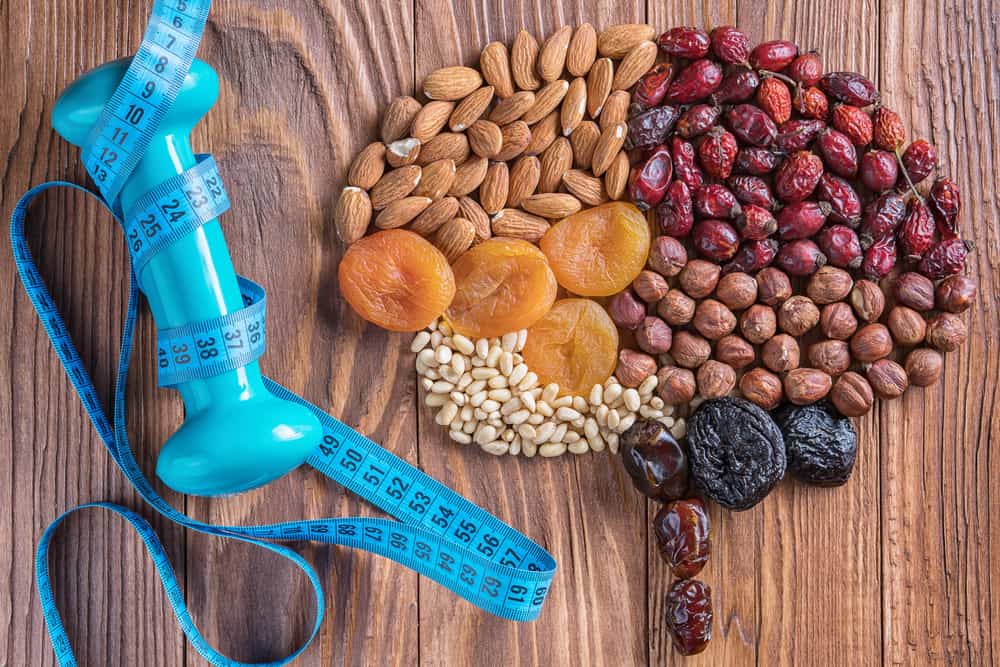
Cauliflower is also known as a great source of
choline
, or vitamin B, according to
Nutrition Reviews
. This vitamin is important for overall brain health and development.
With phosphorus, this vitamin repairs cell membranes and improves learning ability, memory, and muscle movement. In addition, it also helps in the transmission of nerve impulses, assisting in fat absorption, and reducing chronic inflammation.
The combination of vitamin B6 and potassium in cauliflower promotes proper communication in the brain nerves, maintains brain health, and produces the necessary number of neurotransmitters, including dopamine and norepinephrine.
Choline is also beneficial during pregnancy because it stimulates the brain activity of a fetus in utero. For the elderly, the compound is able to reduce the risk of age-related decline. There are also some studies that have proven that vitamin K has a positive impact on psychomotor behavior and cognition.
Better Digestion and Prevention of Digestive Health Issues
Cauliflower is rich in water content and fiber, which can help individuals maintain a healthy digestive tract while aiding in constipation. According to some, adding a proper amount of fresh cauliflower to your diet contributes to toxins excretion through stools and bile.
Overall, the fiber in cauliflower may be good for constipation by increasing the frequency of bowel movements.
Iron Absorption
Since cauliflower is rich in vitamin C, it helps improve iron absorption and release iron from such non-heme sources as vegetables, fruits, and nuts. Vitamin C, also known as ascorbic acid, promotes iron absorption by preventing the formation of insoluble and unabsorbable iron compounds.
Hormonal Balance
This vegetable is also known for antioxidants that help improve the hormonal balance by reducing unhealthy levels of estrogen, which can cause a hormonal imbalance.
Cauliflower contains indol-3-carbinol that helps increase the excretion of estrogen. Moreover, a balanced estrogen metabolism achieved by regular cauliflower consumption helps reduce the risk of some serious health issues.
Eye Health
Vitamin C in cauliflower is thought to reduce the risk of some eye health issues among older people. As sulforaphane is found in cauliflower, this compound protects retinal tissues from the damage caused by oxidative stress.
When you increase your vegetable intake, you’re boosting your overall health and making weight loss easier. With Noom, you’ll learn how to manage your food intake so you can lose weight and keep it off. DietSupplement readers can take advantage of a special Noom free trial offer today!
How To Prepare Cauliflower
Now you know the health benefits of cauliflower, it is time to find out how to cook this vegetable. There are several simple ways to cook cauliflower, so it shouldn’t be hard to find one that works for you.
Bake
This is one of the easiest ways to cook cauliflower.
You will need to take raw cauliflower, wash it thoroughly, chop it into bite-size pieces, and then toss the pieces into a bowl with a drizzle of olive oil, salt, and some of your favorite spices. If you need more flavor, you can also add fresh herbs, smashed garlic or garlic powder, and even some parmesan cheese.
Place the cauliflower pieces on a baking tray and bake them in the oven at 450F for prime caramelization. You will have a simple and delicious meal that is perfect for lunch or light dinner.
Steam
For some people, steaming cauliflower is not the tastiest, but it is the healthiest way to cook this vegetable.
You will need to fill a pot with two inches of water and boil it. Chop cauliflower into small pieces, put them into a heat-proof colander or steaming basket, and slide it into the pot. Cover it with the lid and let the cauliflower cook for 3-8 minutes, depending on what texture you prefer more.
When it is cooked, do not forget to drizzle it with some salt, pepper, and butter.
Mash
You can also mash your cauliflower into a delicious puree. It can become a great and healthier alternative to mashed potatoes.
All you need to do is to wash cauliflower, boil it until it is soft, and then mash it. You can also add some of your favorite mashed potato additional like salt, sour cream, butter, milk, broth, and roasted garlic. Blend all the ingredients to your preferred consistency and serve warm with some cheese and bacon on the top.
Grill
Grilled cauliflower is a perfect idea for a healthy main course.
First, chop off the vegetables’ leaves and cut the end of it, so it can balance on the base. Then slice the veggie into a couple of steaks. Make sure that they are not too thick, so they can cook evenly.
Brush your steaks on both sides with a mixture of your seasonings and olive oil, and put them on a grill. Make sure that you are cooking them at medium-high heat. Each side should be cooked for about 5 minutes until the steak is tender enough.
Roast
In order to optimize your results, cut the cauliflower into bite-sized pieces with flat edges. Having flat edges is important because it will help the cauliflower to caramelize. Like most other vegetables, cauliflower needs some breathing room on a pan.
Bake the cauliflower in the oven at 425F and do not forget to turn halfway through baking. Roast until the cauliflower florets are deeply golden with some brown spots. It should take you about 25-35 minutes.
Cauliflower can be a good replacement for rice, potatoes, and other simple carbs, but its cousin, broccoli, can also be a good option. Want more options? With Noom you’ll learn more about how the body works to optimize your nutritional intake to better meet your needs. Start with Noom‘s free trial offer to take back control.
Nutrition Value of Broccoli
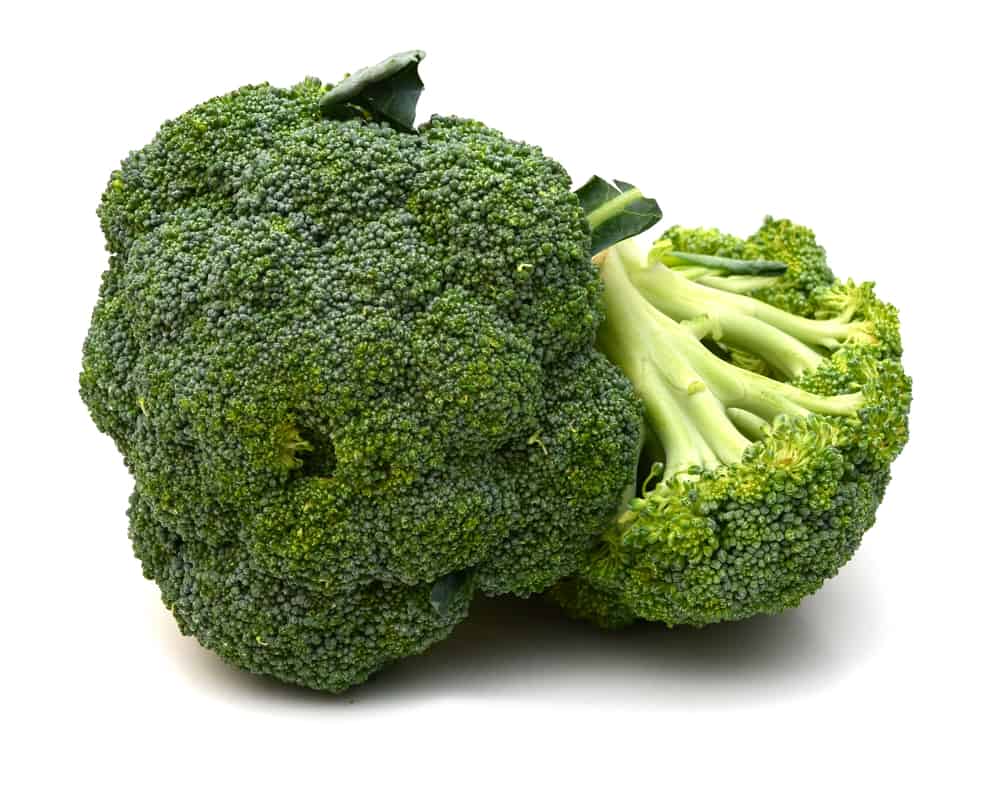
According to the United States Department of Agriculture, one cup of raw broccoli contains the following:
- 31 calories
- 0.3 grams of fat
- 30 mg of sodium
- 1.5 grams of sugar
- 6 grams of carbohydrates
- 2.4 grams of fiber
- 2.5 grams of protein
- 0.65 mg of iron
- 43 mg of calcium
- 287 mg of potassium
In addition, this green vegetable also contains vitamins A, C, E, K, vitamins B, and folic acid.
Health Benefits of Broccoli
According to Mini-Reviews in Medicinal Chemistry, broccoli is known as one of the healthiest vegetables that provide numerous health benefits.
High Levels of Antioxidants
Broccoli is loaded with many powerful antioxidants, including quercetin, beta carotene, lutein, vitamin C, glucarate, sulforaphane, indoles, and glutathione.
Antioxidants are very important because they help prevent a number of different health conditions caused by increased oxidative stress. For example, these compounds are known to protect the human macula, part of the retina at the back of the eye, from destruction by oxygen free radicals that are generated through normal oxygen metabolism.
As a result, consuming broccoli and increasing the level of antioxidants in the diet is thought to slow down vision loss and macular degeneration – one of the most common eye conditions among older people.
Bone Health
Broccoli promotes the absorption of calcium – an element that is important for healthy and strong bones. This vegetable also should be in children’s diet because it can help individuals grow with good nerves and muscles.
It also has other important nutrients that are necessary for healthy bones, including zinc, magnesium, and phosphorus. It is also rich in vitamin K, which has been shown in Molecular Medicine Reports to boost bone health. The daily value of vitamin K for an adult is 80 mcg, and 100 grams of broccoli contains 101.6 mcg of this green vegetable.
Prevention of Heart Diseases
Broccoli has a high concentration of folic acid that helps prevent cardiovascular health problems. The vegetable also has lutein, which is considered an anti-inflammatory agent that is able to reduce plaque in the blood vessels, including the arteries feeding the heart.
This veggie is also packed with potassium helping to keep the blood pressure normal. In addition, it is also low in sodium, which is especially important for people watching their blood pressure.
Promotion of Good Vision

Our eyes contain substantial amounts of zeaxanthin and lutein – the phytochemicals related to vitamin A found in broccoli.
Healthy Digestion and Reduced Constipation
Fiber and antioxidants in this healthy green vegetable are important for supporting the digestive system and healthy bowel function.
Healthy bowel and a strong community of healthy bacteria in the digestive tract are two main digestive health components. Therefore, eating broccoli regularly may play a significant role in maintaining healthy gut function.
One study published in Nutrition and conducted in 2011 found that mice that were on a broccoli diet had reduced levels of inflammation in the colon and positive changes in their gut bacteria.
Another, a more recent human study conducted in 2015, indicated that people consuming broccoli regularly could defecate more easily than the people who did not. This proves that consumption of broccoli reduces constipation.
Healthy Brain Function
Certain nutrients contained in broccoli helps slow down the brain decline. The American Academy of Neurology conducted one study in 2018, in which 960 older adults participated. The study results showed that just one serving of broccoli might help reduce the mental decline associated with age.
Another animal study published in PLoS One indicated that mice fed with kaemferol, a compound found in broccoli, had reduced inflammation of neural tissues associated with a stroke-like event and lowered brain injury incidence.
Healthy Immune System
Vitamin C that broccoli is packed with is one of the most essential components of our immune system. This vitamin plays an important role in the prevention and treatment of various diseases and infections. It contributes to immune defense and supports different cellular functions of both adaptive and innate immune systems.
Vitamin C strengthens the barrier function against dangerous pathogens and environmental oxidative stress. One serving of broccoli boasts 84% of the recommended dietary intake of this vitamin.
Healthy Pregnancy
There are also health benefits of broccoli for pregnant women. During pregnancy, a woman needs many vitamins, nutrients, minerals, and other compounds to remain healthy and support a baby.
Broccoli is a must in a pregnant woman’s diet because it is a great source of folate and vitamin B, namely B9. Folate is needed for the development of the spinal cord and the brain of a fetus. Regular consumption of broccoli that is rich in folate helps ensure healthy pregnancy outcomes.
There are also several studies proving this. One animal study published in Behavioral Brain Research has proven that broccoli sprouts are an effective neuroprotectant in rats.
If you struggle to find ways to eat broccoli and cauliflower because you don’t like the taste, you’re not alone. Noom offers personalized meal plans so you can try them in new ways to find one you like. Check out Noom free trial offer to lose weight for good.
How To Prepare Broccoli
Now you know about the health benefits of broccoli, it is time to discuss the way to prepare and cook it. You have many options, and there are many different recipes. However, he is a list of the easiest and healthiest of them:
Microwave
With the help of a microwave, you can cook broccoli from inside efficiently. The heat gets directly to the molecules of the vegetable and makes it heat up fast.
You can also put broccoli chopped in pieces in a container, add some water, cover it with a lid and steam it for several minutes. The cooking process in a microwave normally does not take more than 3 minutes.
You should be extremely careful by removing broccoli because the steam can be scalding, and you can burn yourself easily.
Steam
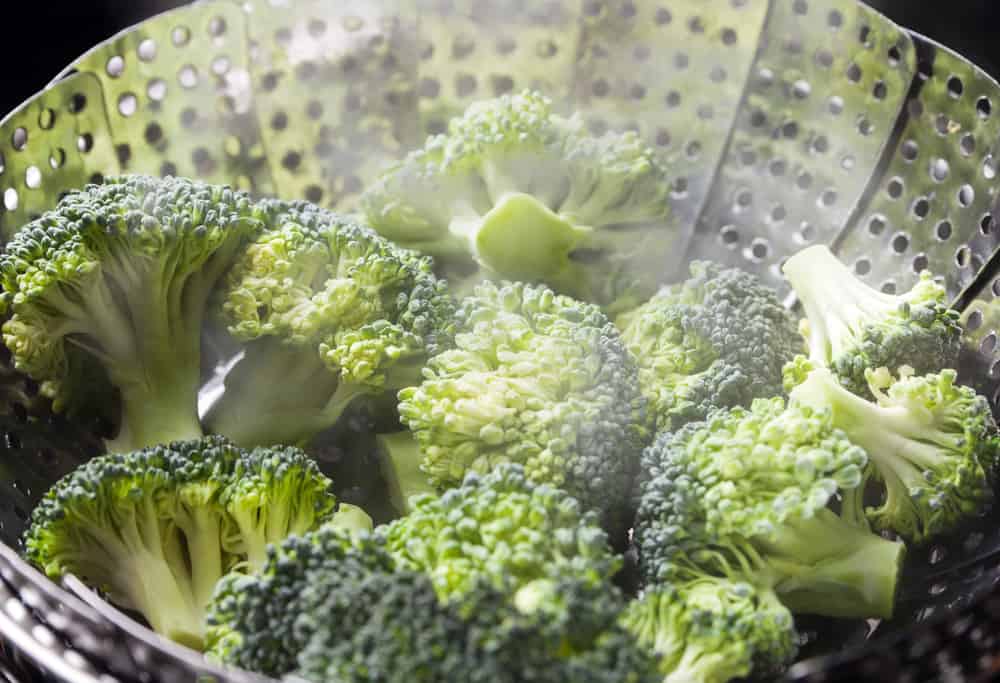
If you choose the steaming option, you should know that cooking this veggie any more than 7 minutes increases the risks of overcooking it. If you cook it for more than 7 minutes, it will turn olive green and lose its natural bright green color.
To steam broccoli, get the steaming water hot first. You can use a tea kettle for this. Only when the water is hot you can add broccoli to the steamer basket. Set the timer for about 5 to 6 minutes. If the florets are small, they may need no more than 5 minutes.
More mature or larger florets usually cook for 6 minutes. It is better to start with 5 minutes and then test your broccoli with a fork. If it is not cooked through, you can add one more minute. When it is ready, you can toss it with some salt and black pepper, add some butter, and serve it warm.
Boil
First, you need to wash broccoli thoroughly in cold water. Let it dry, peel the stem and break apart the florets. Take a large pot, fill it with water, and bring the water to a boil. You can also add some salt. Put the broccoli florets into the pot and cook them uncovered for about 2-3 minutes.
You may need a little bit more time, depending on the size of the florets. Make sure that they are tender before transferring them to a plate. Sprinkle them with some salt and pepper, add some butter and serve warm with lemon wedges.
Saute
The robust texture of this vegetable makes it a perfect candidate for stir-frying or sauteing. You can use a stainless steel pan, wok, or cast iron pan for this type of cooking. However, this method may be a bit more challenging than others because dry-heat cooking in oil may cook only the outside, leaving the vegetable’s interior tough.
Here is the trick you should know: saute it first for a couple of minutes to encourage browning and then add a few tablespoons of water, cover the florets, and steam them until they become tender. You can replace water with a stir-fry sauce to help enhance the flavor and tenderize the vegetables.
Roast
Roasting broccoli can completely change the taste. It emerges with a slight sweetness and removes the sulfurous notes. First, preheat the oven to 400F. Cut broccoli florets from the stem. Mix the florets and stem pieces with some olive oil, salt, and black pepper and place them on a baking sheet.
Roast your broccoli florets in the oven for about 18 until it becomes tender. Serve it warm with a squeeze of lemon juice.
Bottom Line on Broccoli and Cauliflower Results
Broccoli and cauliflower are considered very healthy and antioxidant vegetables packed with the most essential nutrients, minerals and vitamins. They have many health benefits, including prevention of cardiovascular health conditions, strengthening of the immune system, improvement of brain function, protection of the eyes and vision, and contribution to overall health.
For this reason, they should be added to the diet of every person regardless of age, gender, or existing health condition.
Both of these vegetables provide the body with the nutrients it needs to function at its best. Adding more nutrient-dense foods like this one will make it easier for natural weight loss to occur. Noom is there to support your journey every step of the way. Check out Noom free trial offer today, and you’ll see for yourself.
The Dynamic Duo: Health Benefits of Cauliflower and Broccoli Questions & Answers
Cauliflower and Broccoli belong to the species Brassica oleracea, which is part of the mustard family. The two vegetables are classified as biennial plants, meaning they take two years to complete their life cycle.
The Dynamic Duo: Health Benefits of Cauliflower and Broccoli Questions & Answers
Cauliflower and Broccoli belong to the species Brassica oleracea, which is part of the mustard family. The two vegetables are classified as biennial plants, meaning they take two years to complete their life cycle.
Article Sources
- https://www.usda.gov/
- https://noom.8utb.net/c/1720052/500038/8591
- https://noom.8utb.net/c/1720052/500038/8591
- https://pubmed.ncbi.nlm.nih.gov/23631258/
- https://www.ncbi.nlm.nih.gov/pmc/articles/PMC3705355/
- https://pubmed.ncbi.nlm.nih.gov/19335713/
- https://www.ncbi.nlm.nih.gov/pmc/articles/PMC4637098/
- https://pubmed.ncbi.nlm.nih.gov/19906248/
- https://noom.8utb.net/c/1720052/500038/8591
- https://noom.8utb.net/c/1720052/500038/8591
- https://noom.8utb.net/c/1720052/500038/8591
- https://noom.8utb.net/c/1720052/500038/8591
- https://www.usda.gov/
- https://pubmed.ncbi.nlm.nih.gov/19519500/
- https://pubmed.ncbi.nlm.nih.gov/29749440/
- https://pubmed.ncbi.nlm.nih.gov/22113065/
- https://pubmed.ncbi.nlm.nih.gov/25617536/
- https://pubmed.ncbi.nlm.nih.gov/29263222/
- https://pubmed.ncbi.nlm.nih.gov/23437066/
- https://pubmed.ncbi.nlm.nih.gov/23437066/
- https://pubmed.ncbi.nlm.nih.gov/29099763/
- https://pubmed.ncbi.nlm.nih.gov/26014855/
- https://noom.8utb.net/c/1720052/500038/8591
- https://noom.8utb.net/c/1720052/500038/8591
- https://noom.8utb.net/c/1720052/500038/8591
- https://noom.8utb.net/c/1720052/500038/8591
Partner with Us!
Looking to promote your weight-loss products or services?
Our platform reaches a dedicated audience actively seeking the best solutions. Contact us to explore advertising opportunities and grow your brand with us.
Get in Touch